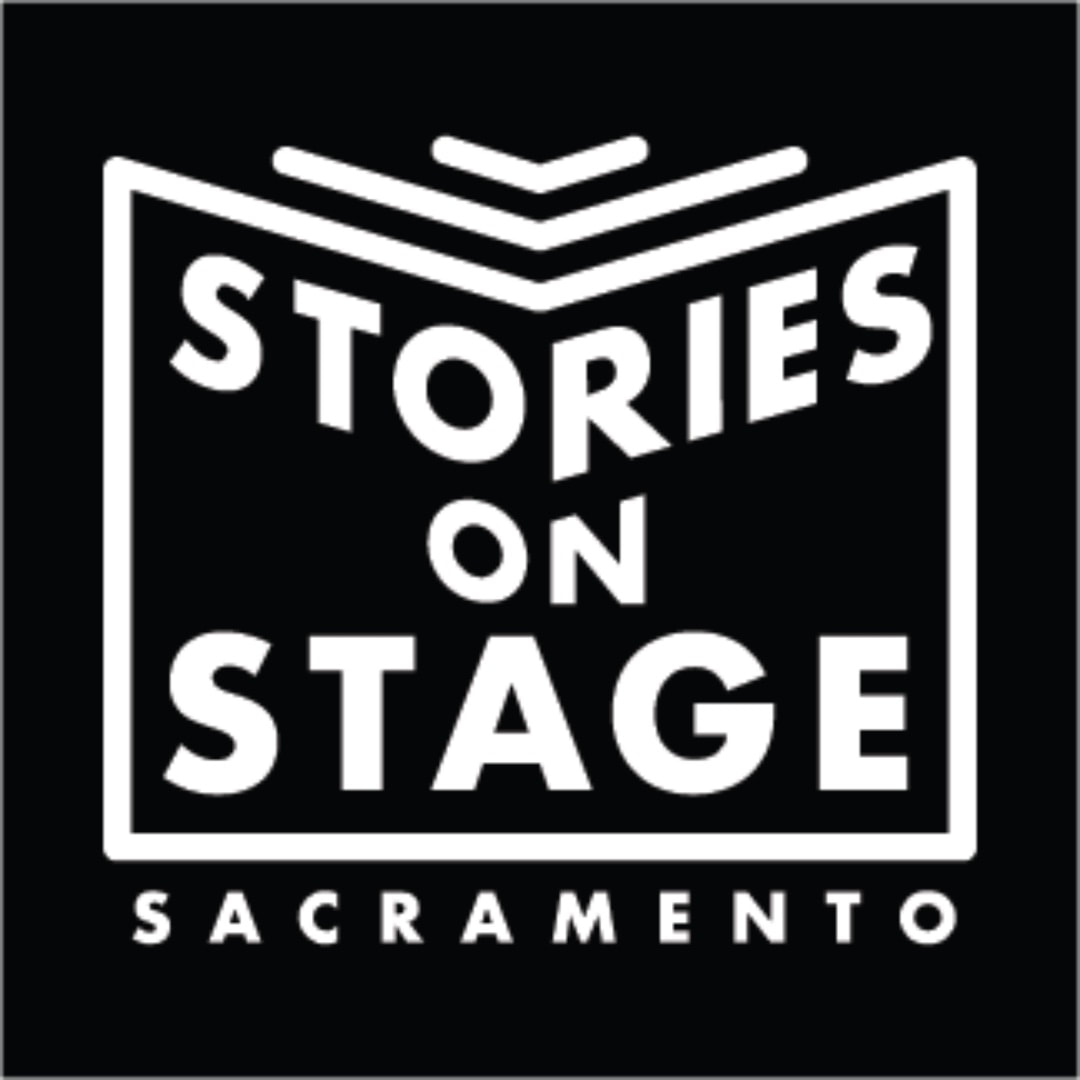Sue Staats interviews Alia Volz | Author of Home Baked | Our April 30/May 1 featured author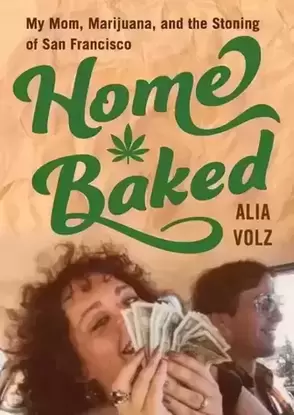 About a week ago, I picked up my copy of Alia Volz’s Home Baked and settled in for a light, fun read. A little romp through the 70s and 80s, in San Francisco – weed, parties, free love – what’s not to enjoy, right? Especially since, for me, it would echo my own younger days—a welcome respite, as this past year has been – I guess you could say – the anti-party year. I was ready for some literary fun - and this book would provide plenty of entertainment and exuberance. The cover guaranteed it - just look at the sassy, laughing woman, her curly hair tossed in the wind from the open car window, grinning behind a fan of cash, no doubt scored from the sale of her famous pot brownies! And so I began. But wait. Home Baked – My Mom, Marijuana, and the Stoning of San Francisco – had plenty of pot, parties and hippie goings-on, all written in an engaging and fast-paced style – but there was also some serious history. Because going on at the same time was the rise of gay culture and then the AIDS crisis, the assassinations of Harvey Milk and George Moscone, and the Jim Jones/People’s Temple horror. And through it all Meridy Volz, Alia’s mother, was building one of the largest underground edibles businesses in the country, and she knew many of the players in this history, and, of course, sold her product to quite a few. And as it turns out, Meridy’s willingness to break laws that, back then, had serious consequences, predicted today’s recognition of weed’s medical value and its continuing legalization. But the very smart – and funny – Alia Volz doesn’t preach. She knows how to blend history and storytelling. In an interview in the SF Chronicle, she calls her memoir a “Trojan horse, sneaking the history lesson into your brain while you think you’re reading about a fun family story.” This sneaky history lesson has won rave reviews and been recognized for its excellence by being selected as a finalist for the National Books Critics Circle Award in Autobiography. Alia has also been interviewed on NPR’s Fresh Air, numerous national publications, and now by me. I loved the book and was thrilled to e-chat with her this week – and am looking forward to seeing her during out April 30 event (don’t forget to register!) 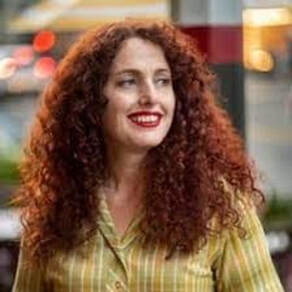 SUE: Alia, I loved the book, and the memories it brought me, and also being reminded of a period of history that’s been washed aside by the recent tumult. Tell me, what was the spark that ignited this memoir? ALIA: Growing up, I was part of this incredibly vibrant world that I had to keep secret in order to protect it. Perhaps it was inevitable that I would someday want to tell the story of my family’s role in the dawn of medical cannabis. I tried a few different approaches without really finding the heart. Then, in the conversations leading up to the 2016 election when it was clear that California would legalize adult use, I kept noticing that the crucial role of HIV-AIDS activism was being left out of the story. It seemed like a kind of erasure, and it felt wrong. Having grown up inside that movement, I realized that I held a unique piece of the puzzle. That kicked me into gear. SUE: I know that you had some difficulty in finding a publisher, at first. What did you do to the manuscript that led to its being picked up on your second try? What magic did you apply? ALIA: Home Baked started as an oral history. That was the version that didn’t sell in 2009. At that time, editors also saw cannabis as a niche subject with a small audience—and that has obviously changed on a cultural level. I was heartbroken when the first version didn’t sell. I didn’t touch it for years. During that time, I developed skills in personal writing. When I picked this project up again, I reconceived it as a memoir. You’ll notice that Home Baked is still heavily driven by interviews and research, but the first-person narrator helps guide readers through the story. SUE: It’s obvious you did extensive research. Was there anything there that surprised you? Anything that changed the direction of the book? 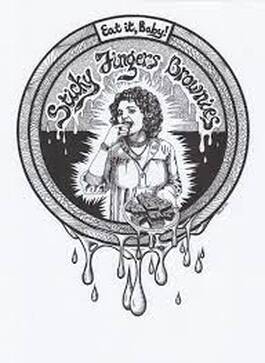 ALIA: The biggest surprise was discovering that my mom was a true pioneer in the field. She never thought of herself that way, so I didn’t either. It was only through exhaustive research that I realized how exceptional the scale and model of her business was for its day. So, one of the pleasures of Home Baked has been showing my mom how important her role was. SUE: All this history was happening around you as a child. Do you have any memory of it? When you were doing research, were you often surprised at what was going on around you? ALIA: Absolutely! I’m lucky in that the events of this story took place in such a juicy period in San Francisco history. I kept having to drag myself out of rabbit holes because it was all so fascinating. Of course, nearly half of this book takes place before I was born. My own memories kick in during the Reagan years and the HIV-AIDS crisis. I have intense memories from that period, but I couldn’t understand the scope of it as a child. I’m a research hound (obviously), and I loved the process of contextualizing my childhood from an expansive socio-political perspective. Honestly, everyone should try it. SUE: It’s got to be tricky, writing a warts-and-all autobiography featuring two living parents. I know they cooperated with you, but did they read the book? What did they think of it? Has your relationship with them changed since publication? ALIA: The whole process was collaborative. I think of this book as community storytelling more than traditional memoir. I wanted to make sure my writing captured how each person felt in the moments they shared with me. I asked my parents to read Home Baked before it went to press, because I wanted to know if anything felt untrue. When conflicting stories came up, I tried to include both versions on the page. You’ll see places in the book when I simply shrug and admit I don’t know what really happened. Memories are messy, and I wanted to capture that. Contrary to what you might expect, Home Baked brought all of us closer together. My dad and I had been estranged for years when I started interviewing him. For the good of the project, we dug through boxes together and had long-overdue conversations. I was awed by his bravery in discussing taboo subjects and past mistakes. We became close in a way we’d never been before. He and my mom even struck up a new era of friendship as a result of this book. It’s pretty wonderful. SUE: You were raised unconventionally. How did that affect you as a young person, and later, as an adult? As a mother? ALIA: I am childfree by choice, so I can’t speak to motherhood. I did struggle as a kid, because I never felt I had much in common with children my age. I couldn’t relate to my classmates, so that got lonely. I started meeting other weirdos and misfits in high school. Once I learned to take pride in being an outsider, I was fine. Looking back from an adult perspective, I feel that growing up in the cannabis underground gave me a strong moral compass. I was raised with the understanding that authority figures didn’t always have my best interests at heart. Now that I’m grown, I know this to be fact. So, I learned to think critically at an unusually young age. SUE: I felt some kinship with Meridy, in that in the 70s I was raising daughters as a single mother in a similar freewheeling lifestyle. We believed kids should have a lot of freedom to make their own decisions. As adults, both my daughters have said they wished they’d had more rules and more boundaries. I’m curious, do you feel that about your upbringing? ALIA: I’ve heard similar things from other weed kids, but I’ve never felt that way myself. Freedom worked for me. My mom wasn’t big on rules, but she was a deeply engaged, encouraging, hands-on parent. The stereotype of the neglected hippie kid doesn’t match my experience. We were attached at the hip. Granted, tagging along with my mom put me into some intense situations—especially during the HIV-AIDS crisis when we sometimes brought brownies to people who were dying—and it’s fair to say I have some trauma from that. But my mom was always there, making eye-contact, holding my hand, checking-in with me emotionally. I always felt safe. It’s only looking back as an adult that I see how wild some of that was. SUE: You write with such emotion about the legalization of marijuana and the failure of the government to recognize the medical benefits of weed. Do you consider yourself a cannabis activist? Do you find, after people read the book, that they think of you that way? ALIA: I’m sure people think I wake up with my mouth on a bong—which is funny. In reality, I rarely consume cannabis. I do, however, care passionately about people having legal access, especially those who use it for medical reasons. I care passionately about counteracting the tremendous harm inflicted by the drug war on communities of color and small farmers. The more you learn about the racism and political jockeying behind drug policy, the more infuriating it is. SUE: How do you feel that you resemble your parents? You look so much like your mother – I wonder if you’re like her. ALIA: I take that as a compliment, thank you! My parents taught me to prioritize making art above all else—which is invaluable for a writer. I’d say I learned my rigorous creative practice from my mom and picked up my archivist tendencies from my dad. SUE: You’re conducting a workshop on May 1, the day after your Stories on Stage Sacramento event. It’s entitled “The Art of Questioning Everything.” What will attendees get from this? What do you hope they take away? ALIA: I built “Memoir: The Art of Questioning Everything” around one of my breakthrough moments as a writer, so I hope students will feel inspired and liberated by the methods we’ll discuss. If you look to what’s mysterious in your own life, the material becomes limitless. I wish someone had broken this concept down for me earlier, and that’s why I’m excited to share it with other writers. We’re excited to have you! And congratulations on the publication of Home Baked in paperback. Everyone should have a copy! 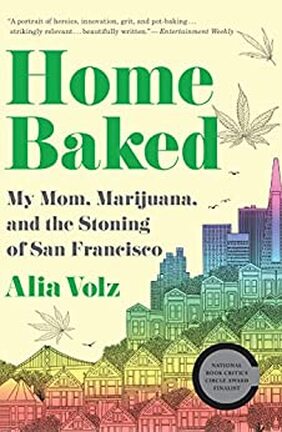 Check out the new Paperback cover for HOME BAKED! ✸ Winner of the California Bookseller Association's Golden Poppy Award for Nonfiction ✸ One of Entertainment Weekly's "Books to Read in April" ✸ One of Lambda Literary's "Most Anticipated LGBTQ Books of April 2020" ✸ One of Reader's Digest's “Best Reads From the 2020 Quarantine Book Club” ✸ One of She Reads' "Most Anticipated Memoirs of 2020" ✸ One of Alma's "Favorite Books for Spring 2020" ✸ Included on 7x7's "Spring Reading List: Books by Bay Area Authors" I could have asked endless questions of Alia – there are whole areas of her life, and the generation of the book, that we did not touch on. If you’re curious, click on these links – among other things, Alia’s also an accomplished equestrienne AND a professional translator…. Alia’s interview on NPR’s “Fresh Air.” https://www.npr.org/2020/04/28/847250943/a-home-baked-childhood-when-the-family-business-is-marijuana-brownies Article in the SF Chronicle https://datebook.sfchronicle.com/books/mom-was-a-dealer-qa-with-alia-volz-author-of-homebaked From The Debutante Ball https://www.thedebutanteball.com/interview-with-alia-volz-author-of-home-baked/ Interview from SF Weekly, 2014 https://www.sfweekly.com/culture/the-write-stuff-alia-volz-on-not-settling-and-being-difficult-to-manipulate/ There’s more cool stuff on Alia’s website, where you can also order a Sticky Fingers t-shirt! https://aliavolz.com/
others. She earned an MFA from Pacific University, and was a finalist for the Gulf Coast Prize in Fiction and the Nisqually Prize in Fiction. Her stories have been performed at Stories on Stage Sacramento and Stories on Stage Davis, and at the SF Bay-area reading series “Why There Are Words.”
0 Comments
|
|
Who We AreLiterature. Live!
Stories on Stage Sacramento is an award-winning, nonprofit literary performance series featuring stories by local, national and international authors performed aloud by professional actors. Designated as Best of the City 2019 by Sactown Magazine and Best Virtual Music or Entertainment Experience of 2021 by Sacramento Magazine. |
|
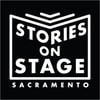
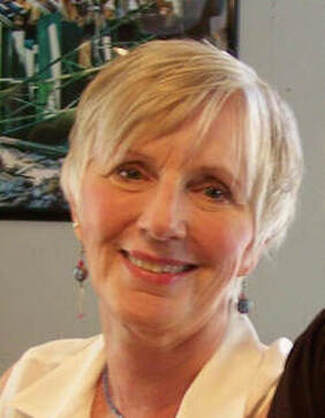
 RSS Feed
RSS Feed
